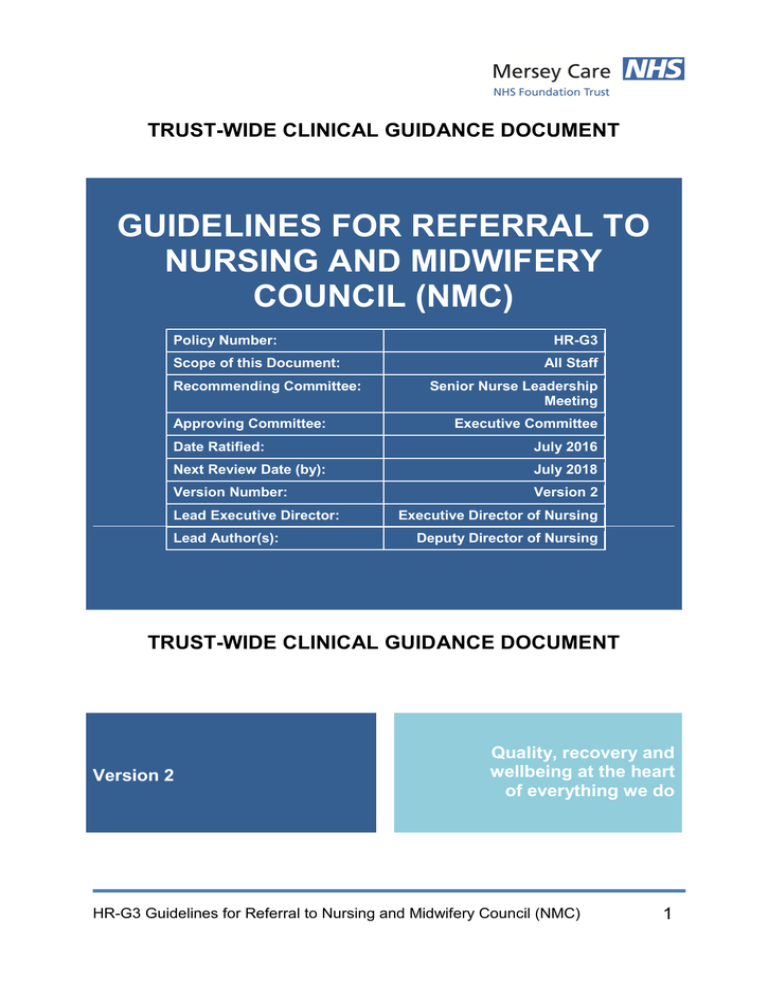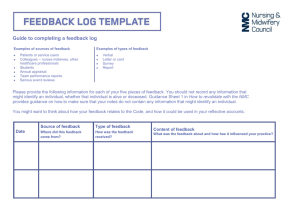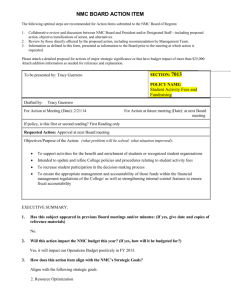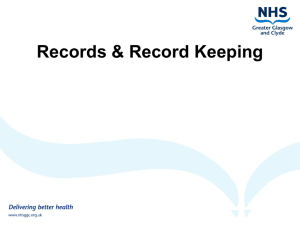
TRUST-WIDE CLINICAL GUIDANCE DOCUMENT
GUIDELINES FOR REFERRAL TO
NURSING AND MIDWIFERY
COUNCIL (NMC)
Policy Number:
Scope of this Document:
Recommending Committee:
Approving Committee:
HR-G3
All Staff
Senior Nurse Leadership
Meeting
Executive Committee
Date Ratified:
July 2016
Next Review Date (by):
July 2018
Version Number:
Version 2
Lead Executive Director:
Lead Author(s):
Executive Director of Nursing
Deputy Director of Nursing
TRUST-WIDE CLINICAL GUIDANCE DOCUMENT
Version 2
Quality, recovery and
wellbeing at the heart
of everything we do
HR-G3 Guidelines for Referral to Nursing and Midwifery Council (NMC)
1
TRUST-WIDE CLINICAL GUIDANCE DOCUMENT
GUIDELINES FOR REFERRAL TO
NURSING AND MIDWIFERY COUNCIL
(NMC)
Further information about this document:
Document name
HR-G3 GUIDELINES FOR REFERRAL TO NURSING AND
MIDWIFERY COUNCIL (NMC)
Document summary
The aim of these guidelines is to provide guidelines in
relation to the process for referral to the NMC
Author(s)
Contact(s) for further
information about this
document
Published by
Copies of this document are
available from the Author(s)
and via the trust’s website
To be read in conjunction
with
Helena McCourt
Deputy Director of Nursing
Telephone: 0151 471 2428
Email: Helena.McCourt@merseycare.nhs.uk
Mersey Care NHS Trust
V7 Building
Kings Business Park
Prescot
Merseyside
L34 1PJ
Your Space Extranet: http://nww.portal.merseycare.nhs.uk
Trust’s Website www.merseycare.nhs.uk
Disciplinary procedures (HR01)
Capability Policy and Procedure (HR11)
Corporate Policy and Procedure on the Prevention and
Management of Workplace Stressors (HR13)
NMC Code of Conduct
https://www.nmc.org.uk/globalassets/sitedocuments/nmcpublications/nmc-code.pdf
This document can be made available in a range of alternative formats including
various languages, large print and braille etc
Copyright © Mersey Care NHS Foundation Trust, 2016. All Rights Reserved
Version Control:
Version 1
Version 2
Approved
Minor amendments
Version History:
March 2015
July 2016
HR-G3 Guidelines for Referral to Nursing and Midwifery Council (NMC)
2
SUPPORTING STATEMENTS
this document should be read in conjunction with the following statements:
SAFEGUARDING IS EVERYBODY’S BUSINESS
All Mersey Care NHS Trust employees have a statutory duty to safeguard and promote the
welfare of children and vulnerable adults, including:
• being alert to the possibility of child/vulnerable adult abuse and neglect through their
observation of abuse, or by professional judgement made as a result of information
gathered about the child/vulnerable adult;
•
knowing how to deal with a disclosure or allegation of child/adult abuse;
•
undertaking training as appropriate for their role and keeping themselves updated;
•
being aware of and following the local policies and procedures they need to follow if they
have a child/vulnerable adult concern;
•
ensuring appropriate advice and support is accessed either from managers, Safeguarding
Ambassadors or the trust’s safeguarding team;
•
participating in multi-agency working to safeguard the child or vulnerable adult (if
appropriate to your role);
•
ensuring contemporaneous records are kept at all times and record keeping is in strict
adherence to Mersey Care NHS Trust policy and procedures and professional guidelines.
Roles, responsibilities and accountabilities, will differ depending on the post you hold
within the organisation;
•
ensuring that all staff and their managers discuss and record any safeguarding issues that
arise at each supervision session
EQUALITY AND HUMAN RIGHTS
Mersey Care NHS Trust recognises that some sections of society experience prejudice and
discrimination. The Equality Act 2010 specifically recognises the protected characteristics of
age, disability, gender, race, religion or belief, sexual orientation and transgender. The
Equality Act also requires regard to socio-economic factors including pregnancy /maternity
and marriage/civil partnership.
The trust is committed to equality of opportunity and anti-discriminatory practice both in the
provision of services and in our role as a major employer. The trust believes that all people
have the right to be treated with dignity and respect and is committed to the elimination of
unfair and unlawful discriminatory practices.
Mersey Care NHS Trust also is aware of its legal duties under the Human Rights Act 1998.
Section 6 of the Human Rights Act requires all public authorities to uphold and promote
Human Rights in everything they do. It is unlawful for a public authority to perform any act
which contravenes the Human Rights Act.
Mersey Care NHS Trust is committed to carrying out its functions and service delivery in line
the with a Human Rights based approach and the FREDA principles of Fairness, Respect,
Equality Dignity, and Autonomy
HR-G3 Guidelines for Referral to Nursing and Midwifery Council (NMC)
3
Contents
Section
Page No
1. Purpose and Rationale
6
2. Outcome Focused Aims and Objectives
6
3. Scope
6
4. Definitions
6
5. Duties
6
6. Process/Procedure
7
7. Consultation
10
8. Monitoring
10
9. Supporting Documents
10
Appendix A - Flowchart for Referral to Nursing and
Midwifery Council (NMC)
Appendix B - Equality and Human Rights Analysis
HR-G3 Guidelines for Referral to Nursing and Midwifery Council (NMC)
4
1
PURPOSE AND RATIONALE
1.1
The aim of these guidelines is to provide a framework for the process of referral to
the Nursing and Midwifery Council (NMC). This is to ensure that all staff are aware
of the process.
1.2
These guidelines should be read in conjunction with the guidance review by the
NMC web site: www.nmc-uk.org/
1.3
The Code (NMC 2015) for Professional Standards of Practise and Behaviour for
Nurses and Midwives outlines the standards that all registered nurses are required
to maintain. www.nmc.org.uk/standards/code/
2
SCOPE
2.1
These guidelines apply to all registered clinical nurses employed by Mersey Care
Trust.
2
DEFINITIONS
3.1
Table 1: Definitions
Term
NMC
4
DUTIES
4.1
Board / Lead Committee
Definition
Nursing and Midwifery Council.
The Senior Nurse Leadership Team and HR Team will be responsible for the
development, review, consultation, implementation, monitoring and approval of the
NMC guide lines.
4.2
Chief Executive
The Chief Executive has delegated the responsibility to the Executive Director of
Nursing.
4.3
Executive director of Nursing
The Executive Director of Nursing has strategic responsibility for ensuring there is
compliance with the NMC guidelines and that it is applied in a fair and consistent
manner. The Director will cascade and communicate to all Executive Directors,
Directors, Managers, Human Recourses staff, Staff Side representatives and staff
so that they are fully aware of the NMC referred guidelines.
4.4
Deputy Director of Nursing
The Deputy Director of Nursing is responsible for ensuring that Nurses act in
accordance with this policy, for processing all Trust referrals to the NMC and for
providing feedback to the HR team
HR-G3 Guidelines for Referral to Nursing and Midwifery Council (NMC)
5
4.5
Managers
Managers are responsible for supporting staff in relation to referrals to the NMC
and to support the well being and protection of service users.
4.6
Human Resources
The Human Resources, following disciplinary proceeding or capability policy, are
responsible for informing the executive director of nursing of any cases that require
consideration for referral to NMC.
The Human Resources Department will support Mersey Care staff at all levels
in the application of this policy and procedure.
4.7
Staff Support
The Human Resources will provide a confidential Counselling Service for staff.
4.8
Registered Nurses
Registered nurses are accountable for adhering to standards in relation to the
NMC code (2015).
5
PROCESS / PROCEDURE
5.1
Introduction to Nursing and Midwifery Council (NMC)
5.1.1 The NMC is the UK regulator for the nursing and midwifery professions. They exist
to safeguard the health and wellbeing of the public.
5.1.2
Every day, employers and managers deal with situations concerning the
misconduct, lack of competence, bad character or poor health of nurses and
midwives. Most of this can be managed locally through internal disciplinary and
capability procedures and does not give rise to wider concerns about the public’s
health and wellbeing.
5.1.3
The Director of Nursing needs to be assured that there are processes in place for
when a nurse should be referred to the NMC for investigation or if it is sufficient for
the matter to be dealt with through our own internal processes.
5.1.4
In practice most matters will be dealt with by the Trust and not referred to the
NMC. In some circumstances it will be appropriate for the matter to be both
referred to the NMC and dealt with by the Trust.
5.1.5
A referral to the NMC should not delay the length of time it may take to conclude
any internal Trust disciplinary processes.
5.2
When to involve the NMC
5.2.1 All disciplinary matters relating to Registered Nurses must be referred to the
Deputy Director of Nursing’s office so that a consistent approach can be taken as
to when the matter under investigation warrants a referral to the NMC.
5.2.2
Many matters are best dealt with by the Trust, for example, there may be an
instance of minor wrongdoing where no real harm has been caused, and the
HR-G3 Guidelines for Referral to Nursing and Midwifery Council (NMC)
6
matter is not so serious that there is a need to consider a referral to the NMC. In
these circumstances the Trust might need to discipline a nurse or provide them
with further training and support. Most matters will be dealt with internally and will
not warrant referral to the NMC.
5.2.3
All referrals to the NMC are coordinated from the Director of Nursing’s office. The
reasons for the referral to NMC are outlined. The flowchart outlining the steps to
be undertaken is outlined in Appendix 1.
5.3
Nursing and Midwifery Council Categories of Referral
5.3.1 There are 4 broad areas that may warrant referral to the NMC:
a)
Misconduct
b)
Lack of competence
c)
Bad character
d)
Serious ill health
5.4
Urgent Referrals and Interim Orders
5.4.1 As an employer we have the power to suspend or dismiss a member of staff, but
this will not prevent them from working elsewhere as a nurse if registered
accordingly.
5.4.2
The NMC are the only organisation with the powers to prevent nurses from
practicing if they present a risk to patient safety. In very serious cases it will
therefore be appropriate to refer a nurse at an early stage, even before we
conduct our own internal investigation.
5.4.3
This allows for the possibility of the NMC issuing an interim suspension or
restricting the practice of the nurse concerned until the case has been thoroughly
investigated.
5.4.4
Examples of reasons for interim suspension orders being issued by the NMC
include:
•
Theft of medication
•
Assault of patient
•
Possession of drugs with intent to supply
•
Aggressive behavior toward a colleague
•
Allegation of sleeping on duty
•
Persistent failings in the registrant’s standard of practice over a 2 year
period
•
Serious allegations of patient neglect and theft from patients
•
Multiple medication errors (two) failure to administer a dose of soluble
paracetamol to a resident and the administration of 10 mg Temazepam to a
resident who had this medication stopped.
5.5
Misconduct
5.5.1 Misconduct is behavior which falls short of that which can be reasonably expected
of a nurse.
5.5.2
The code: Standards of conduct, performance and ethics for nurses and midwives
(the code) is the foundation of good nursing and midwifery practice, and is a key
tool in safeguarding the health and wellbeing of the public. If nurses and midwives
HR-G3 Guidelines for Referral to Nursing and Midwifery Council (NMC)
7
don’t follow the code, they may be guilty of misconduct and therefore might not be
fit to practice.
5.5.3
The most common examples of misconduct include:
a)
Physical or verbal abuse of colleagues or members of the public
b)
Theft
c)
Significant failure to deliver adequate care
d)
Significant failure to keep proper records.
5.6
Lack of competence
5.6.1 Lack of competence is a lack of knowledge, skill or judgment of such a nature that
the nurse is unfit to practice safely. They should demonstrate a commitment to
keeping those skills up to date, and should deliver a service that is capable, safe,
knowledgeable, understanding and completely focused on the needs of the people
in their care.
5.7
Examples of lack of competence
5.7.1 Over a prolonged period of time a nurse or midwife makes continuing errors or
demonstrates poor practice which involves, for example:
a)
Lack of skill or knowledge
b)
Poor judgment
c)
Inability to work as part of a team
d)
Difficulty in communicating with colleagues or people in their care.
5.8
Bad Character
5.8.1 Cases concerning bad character nearly always involve some form of criminal
behaviour that has resulted in a serious legal conviction or caution.
5.8.2
Only serious criminal convictions or cautions should be referred to the NMC. A
minor fixed penalty traffic offence, for example a speeding fine or parking ticket, is
unlikely to be a case for us.
5.8.3 Examples of behavior that indicate bad character
a)
A caution or conviction – for example, involving theft, fraud, violence, sexual
offences, drug dealing, dishonesty.
b)
Accessing illegal material from the internet
5.9
Serious Ill Health
5.9.1 Good health is necessary to undertake practice as a nurse or midwife. Good
health means that a person must be capable of safe and effective practice without
supervision. It does not mean the absence of any disability or health condition.
Many disabled people and those with long-term health conditions are able to
practice with or without adjustments to support their practice.
5.9.2
The NMC are particularly concerned about long-term, untreated or
unacknowledged physical or mental health conditions that impair someone’s ability
to practice without supervision.
5.9.3 Examples of serious ill health;
a)
Long-term, untreated alcohol or drug dependence.
b)
Unmanaged serious mental illness.
HR-G3 Guidelines for Referral to Nursing and Midwifery Council (NMC)
8
5.9.4
The Occupational Health Department will refer to the Director of Nursing’s Office
cases where they have concerns about the long-term, untreated or
unacknowledged physical or mental health conditions that impair someone’s ability
to practice without supervision. The Director of Nursing Office will make a decision
as to whether or not the matter warrants referral to the NMC.
6
CONSULTATION
6.1
The following staff / groups were consulted with in the development of this policy
document:
a)
Senior Nurse Leadership Team
b)
HR Team Forum
c)
HR Policy Group
7
MONITORING
7.1
The guidelines are monitored by the Deputy Director of Nursing in conjunction with
the Senior Nurse Leadership team on an annual basis. Six monthly reports will be
presented at the HR Team meeting and the Senior Nurses Leadership Team
Meeting.
8
SUPPORTING DOCUMENTS
Further Information
8.1
NMC Web Site – www.nmc-uk.org/
8.2
The Code – www.nmc-uk.org/Nurses-and-midwives/The-code/
8.3
The Referral Decision Tree – https://www.nmc.org.uk/search/?q=decision+tree
8.4
Mersey Care disciplinary procedure (HR01)
HR-G3 Guidelines for Referral to Nursing and Midwifery Council (NMC)
9
Appendix A
FLOWCHART FOR REFERRAL TO NURSING AND MIDWIFERY COUNCIL (NMC)
Registered nurses undergoing disciplinary/suspension
a to inform Deputy DoN)
(HR Team
Monthly NMC Meeting with Divisional lead nurses to discuss with Deputy DoN
Discuss with NMC adviser
Decision to refer/send referral form to NMC
Deputy DoN send letter to staff member informing them of referral. cc:
commissioning manager and Investigation Team
Letter to witnesses informing them of referral. Deputy DoN
HR team to provide update of conclusion of investigation and actions to monthly NMC meeting
Feedback to Divisional lead Nurses and investigation team on updates from
NMC and cc: any correspondence received from NMC relating to case
Discuss at monthly Director of Nursing
Senior Leadership Team meeting
Six monthly update to HR team meeting and Senior
Leadership Team Meeting
HR-G3 Guidelines for Referral to Nursing and Midwifery Council (NMC)
10
Appendix B
Equality and Human Rights Analysis
Title: Guidelines for Referral to Nursing and Midwifery Council (NMC)
Area covered: Trust wide
What are the intended outcomes of this work?
To ensure all registered nurses and managers are aware of the process for referral to
the NMC.
Who will be affected?
All nurses employed by Mersey Care Trust.
Evidence
What evidence have you considered?
NMC guidance.
Disability including learning disability
Not applicable.
Sex
Not applicable.
Race
Not applicable.
Age
Not applicable.
Gender reassignment (including transgender)
Not applicable.
Sexual orientation.
Not applicable.
Religion or belief
Not applicable.
Pregnancy and maternity.
Not applicable.
Carers
HR-G3 Guidelines for Referral to Nursing and Midwifery Council (NMC)
11
Not applicable.
Other identified groups
Not applicable.
Cross Cutting
Not applicable.
Human Rights
Is there an impact?
How this right could be protected?
Right to life (Article 2)
Not applicable.
Right of freedom from
inhuman
Not applicable.
and degrading treatment
(Article 3)
Right to liberty (Article 5)
Not applicable.
Right to a fair trial (Article
6)
Not applicable.
Right to private and family
life
Not applicable.
(Article 8)
Right of freedom of religion
or belief
Not applicable.
(Article 9)
Right to freedom of
expression
Not applicable.
Note: this does not include
insulting language such as
racism (Article 10)
Right freedom from
discrimination
Not applicable.
(Article 14)
Engagement and involvement
Senior Nurse Leadership Team and HR Team
HR-G3 Guidelines for Referral to Nursing and Midwifery Council (NMC)
12
Summary of Analysis
Guidelines relevant to all registered nurses employed by Mersey Care Trust.
Eliminate discrimination, harassment and victimisation
Advance equality of opportunity
Promote good relations between groups
What is the overall impact?
Addressing the impact on equalities
Action planning for improvement
Attached.
HR-G3 Guidelines for Referral to Nursing and Midwifery Council (NMC)
13
For the record
Name of persons who carried out this assessment:
Helena McCourt
Kellie Anders
Date assessment completed:
16 May 2016
Name of responsible Director/Director General:
Ray Walker
Date assessment was signed:
HR-G3 Guidelines for Referral to Nursing and Midwifery Council (NMC)
14
Action plan template
This part of the template is to help you develop your action plan. You might want to change the categories in the first column to reflect the actions
needed for your policy.
Category
Actions
Target date
Person responsible and
their Directorate
Awareness raising
Present guidelines to Senior Leadership Nursing Team/HR
Team.
July 2016
Helena McCourt, Deputy
Director of Nursing
Provide six monthly report to Senior Leadership Nursing
Team/HR Team.
September
2016 and
March 2017
Helena McCourt, Deputy
Director of Nursing
HR-G3 Guidelines for Referral to Nursing and Midwifery Council (NMC)
15




